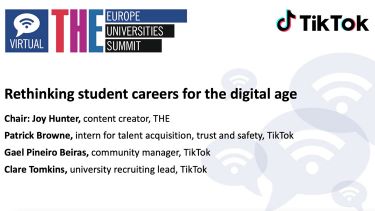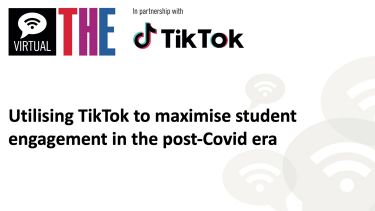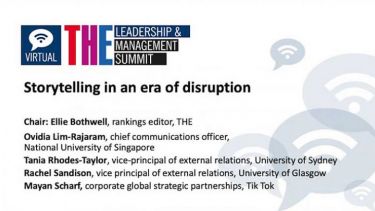As students adapt to the new normal, diverse and tailored support services must be provided
Proactively engaging with students and offering different ways to find help can support well-being during a time of heightened tension and stress.
At a recent THE Live UK session, panellists discussed how universities can best support student well-being to prevent dropouts in the time of Covid-19.
Seeta Bhardwa, student content editor at Times Higher Education, who chaired the session, pointed out what a challenging time it is for students, with the move to online learning seeing many miss out on key aspects of the university experience.
Claire Slater, director of student life and well-being at the University of Bristol, said students were facing challenges such as social isolation and reduced opportunities to make connections. She said her university had taken a “collaborative approach”, working with the student union and other societies and networks to present an innovative and engaging programme of virtual activities.
“Even though we've done that, students have told us in a recent survey that they’re still struggling to feel connected and engaged,” Slater said. “I think we really have to carry on with this work…and keep turning back to students, talking to them and asking: ‘What else can we do to support you?’”
David Woolley, director of student and community engagement at Nottingham Trent University, said there had been a greater focus on “empowering students” since the pandemic, for example through workshops on resilience and goal setting.
His university’s analytics dashboard monitors the digital footprint of all students, producing a daily engagement rating. “We identify who is lowly engaged on the dashboard and then we have a range of things that we can do – from a calling service to personal tutor intervention – to address those students,” Woolley said. “The nature of those interventions depends on the student group.”
Julie Smith, a clinical psychologist, creates hugely popular videos on TikTok, offering tips for students to maintain good mental health. “Sharing all the education and information we have about what keeps us healthy is a huge weapon we have right now against mental health problems,” she told the session.
Smith, who has 2.3 million followers on the platform, encouraged universities to engage with students via social media. “I have a rule that every video has to have an element of value. But you have to walk that tightrope of value versus entertainment. On a platform like TikTok, if you don’t engage someone within those first few seconds, you’ve lost them,” she said. “Translating that information and making it accessible is a huge challenge but a really brilliant and creative one because when you get their attention, you can slip in a bit of education as well.”
Michael Priestley, a PhD student at the University of Durham, said structures need to be put in place to ensure that the student voice was heard, such as having a place to share experiences and suggest what services would be supportive.
Priestly said issues that had traditionally affected some students, like social isolation, loneliness and financial uncertainty, had been “accentuated” by the pandemic: “One of the newer challenges I've noticed is the difficulty of adjusting to the transition to online learning and how students can maintain productivity and engagement.”
Stressing universities should avoid a one-size-fits-all approach, Priestley said virtual spaces for specific student groups, for example postgraduates, provided an opportunity to connect with peers in a similar situation. “You can learn from their experiences and also just feel reassured that you aren’t struggling on your own,” he said.
Identifying struggling students as early as possible and proactively contacting them is an effective strategy. “In my experience, often students are struggling as early as mid-October or November, and if you don’t engage then, things can very quickly spiral out of control,” said Slater. “Have those conversations early because, if you do, you can sort things out. Early intervention is the key.”
The entire session is available above and on the THE YouTube channel. You can also access all of the THE Live UK material here.
Find out more about TikTok.








